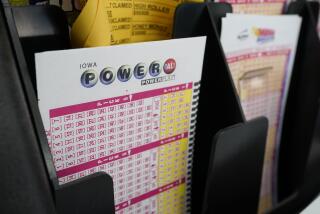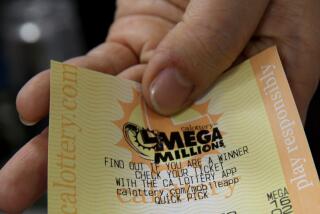The Lotto Is On-Line; State Hopes It’s Winner
With celebrities, balloons and marching bands, the California Lottery launched ticket sales Tuesday for Lotto, its legalized version of the old numbers game, which officials hope will boost flagging interest in the $2-billion-a-year state lottery.
Lotto 6/49 went on-line at 12:30 p.m. when Lottery Director Mark Michalko threw a ceremonial switch on an outdoor stage in Westwood. Within six hours, ticket sales had nearly reached the $1-million mark, and despite scattered reports of computer failures at the state’s 5,000 retail outlets, officials pronounced the kickoff a success.
In four cities around the state, the lottery staged elaborate, simultaneous ceremonies intended to boost first-day ticket sales. Baseball players, an Olympic gold medalist, actors and marching bands were part of the festivities in Los Angeles, San Diego, San Francisco and Sacramento.
At Mission Valley Center in San Diego, hundreds of shoppers and lottery players clutched purple lottery balloons and listened to the San Diego Jazz Ensemble. Steve Garvey and Tony Gwynn of the Padres and UC San Diego students--clad in numbered Lotto balls--took the stage for a skit that explained the new game.
Bill Seaton, director of public affairs for the lottery, flipped San Diego’s own ceremonial switch while lines formed at two kiosks equipped with four terminals. Many people waited in line more than two hours to buy a ticket at the event, to use the free tickets handed out by the college students, or to get a free pin or T-shirt. Mimes handed out raffle slips to win a 1987 Audi.
Seaton told the crowd that terminals around the state could process 7,000 transactions a second. “We have 5,000 terminals all ready to hum to life in the largest on-line lottery system,” he said.
Michalko was joined by Los Angeles Dodgers second baseman Steve Sax, television personality Byron Allen and the UCLA Marching Band on a closed-off Broxton Avenue in Westwood.
Carnival Barker
Sounding a bit like a carnival barker, Michalko told the crowd: “6/49 describes the game. Pick six numbers from the field of 1 to 49. If you match all six, you win the jackpot.
“We have the biggest, quickest lotto game in the world.”
Just how big and how fast remains to be seen.
On Saturday, on a program televised statewide from Beverly Hills, a machine will spit out the winning numbers in the form of six of 49 consecutively numbered balls. Drawings will be held every Saturday at 7:58 p.m. After the first week, the drawings will be in Sacramento.
The size of the jackpot will depend on how many people bet each week, although it is expected to at times mount into the tens of millions of dollars. The odds of winning it on any given week are 1 in 14 million. If no one picks the six winning numbers, the prize money will be rolled over into the nexts week’s pool.
Smaller prizes will be awarded to players who select three, four or five of the winning numbers or five of the winning six, plus a bonus number that will be selected every week. Odds of the smaller prizes are lower.
First-day sales of the $1 tickets fell short of the turnout of a year ago when the lottery made its debut in the form of scratch-off tickets. The lottery sold 21.4 million scratch-off tickets in the first 24 hours at 20,000 retail outlets.
But ticket sales for the scratch-off game have declined steadily since. Michalko said the lottery drew $9 million in sales per day when it began but “stabilized four to five weeks ago at about $2.5 million a day.”
Michalko had predicted that ticket sales for Lotto will initially be less than for the scratch-off tickets but that as people learn to play the game, sales will increase. Lottery officials eventually expect Lotto 6/49 sales to enable California to surpass the Spanish national lottery as the biggest in the world.
The manager of an ice cream shop in Beverly Hills reported 150 customers lined up to buy tickets when play began.
However, just 50 minutes later, the store was deserted.
Most San Diego County stores reported sales of 20 to 300 entries Tuesday afternoon. But Avenue Liquor in Coronado reported 450 tickets sold.
At a store on Hollywood Boulevard in Los Angeles, personnel fiddled in vain with their machine and several would-be customers walked away empty-handed.
Several San Diego County convenience and liquor stores also described problems with Lotto machines that slowed sales. At the Mission Valley mall, a jammed terminal doubled the wait for customers lined up to buy their first chance.
Similar computer problems were reported elsewhere.
Pauline Allen of Garden Grove had a message for lottery officials in Sacramento as she left one store where the machine failed to deliver a ticket: “Tell them I’m put out because I came here wanting to buy a ticket on the first day and it wasn’t hooked up. I just had my 70th birthday, and I came to buy a ticket for my present.”
Six Numbers
The retail computer terminals are used to record the six numbers that gamblers select on so-called “play slips.” The play slips are inserted into the machine, which returns a receipt in the form of a ticket. The $121-million system is hooked into master computers in Whittier and Sacramento.
Lottery spokeswoman Randi Thompson said the problems arose because retailers were “just learning and getting used to the computers” and because gamblers too often picked more than six numbers and, in correcting their picks, marked play slips in a way that caused the computer terminals to reject them.
The UCLA Marching Band, jugglers and mimes entertained nearly 1,000 lunch-hour pedestrians in Westwood. Free Lotto T-shirts and some free chances at the big payoff were handed out. Sax selected the first numbers.
Elsewhere in Los Angeles, Farah Ammari, owner of a Pacoima market, said he sold tickets to about 10 customers in the first half-hour of sale.
Get Excited
“It is wait and see,” he said of the game. “The other (scratch-off) tickets, they got excited about it, but it slowed down very bad.”
Although Lotto sales at his store were less than brisk, he was optimistic.
“This area, my friend, this is a gambling area,” he said, pointing toward the street, which is also home to two pool halls in the same block. “All day long they shoot dice. All day long they play horses. . . . They love it.”
On the grounds of the Capitol in Sacramento, state employees lined up 30 deep at three booths to buy tickets during the lunchtime ceremonies.
In San Francisco, several thousand people spent their lunch hour at Union Square at a celebration that featured more balloons, another marching band, dancers, the San Francisco 49ers cheerleaders and Olympic Gold Medal gymnast Mitch Gaylord.
Contributing to this story were Times staff writers Ken Chavez, Gabe Fuentes and Leonel Sanchez in Los Angeles; Maria L. LaGanga, Gordon Grant and Bob Schwartz in Orange County; Nancy Reed in San Diego; Tilly Fong in Sacramento, and Dan Morain in San Francisco.
More to Read
Go beyond the scoreboard
Get the latest on L.A.'s teams in the daily Sports Report newsletter.
You may occasionally receive promotional content from the Los Angeles Times.










